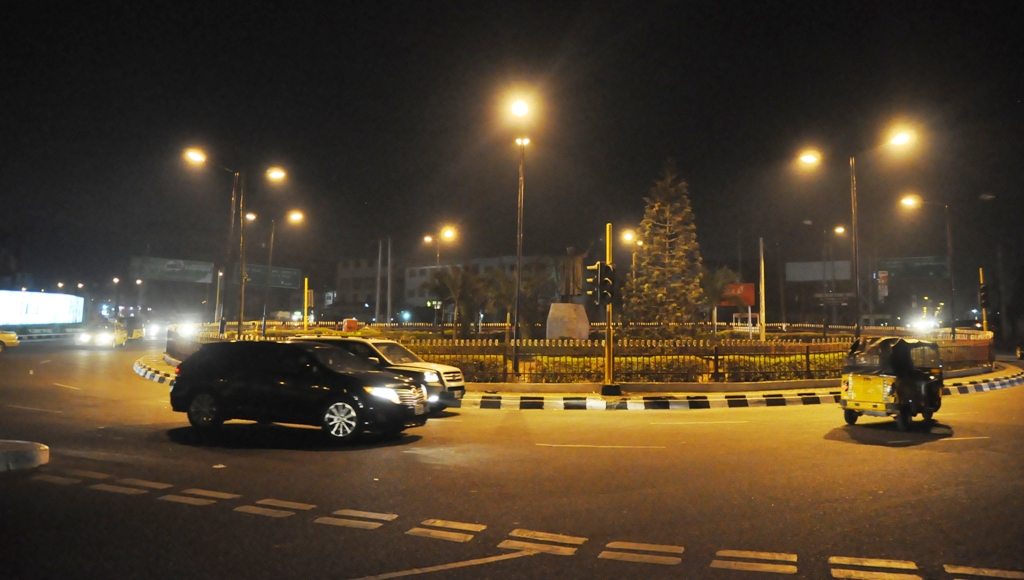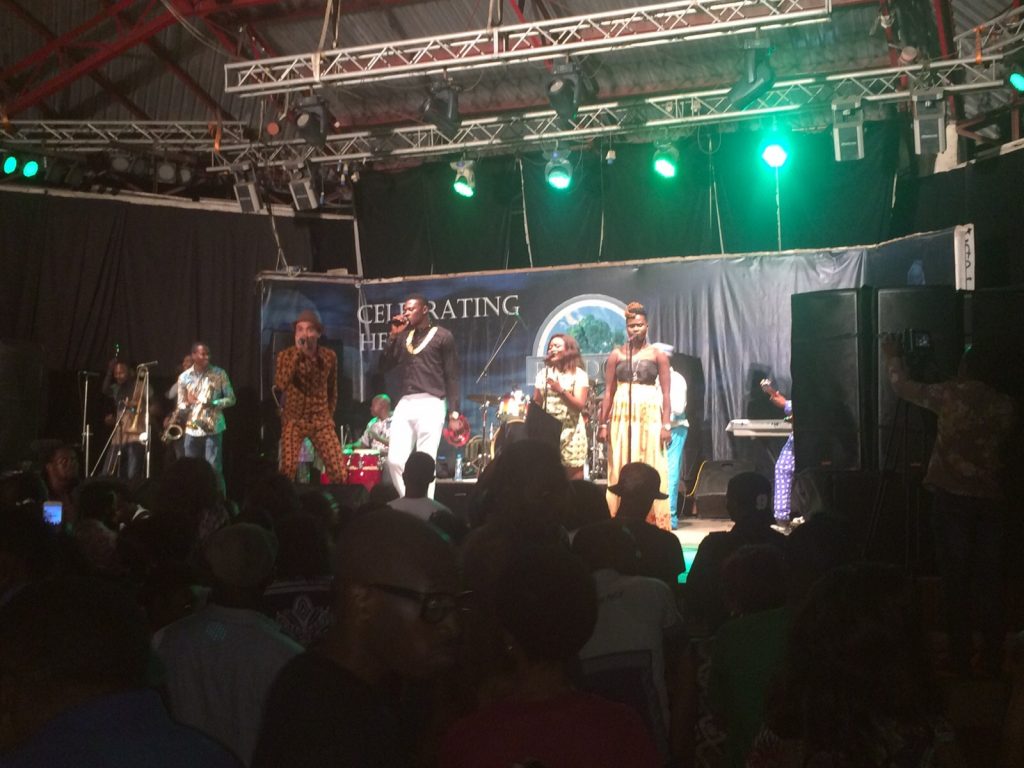How to Use a Friday Night
Lagos is the city of sin. It plays host to jaded men, lying women and tons of broken dreams. Here, married men say “it’s not that serious” when asked about their rings by the single ladies who do a poor job of feigning coyness. On a Friday, it’s easy to mistake Allen Avenue for Adeniran Ogunsanya. Across board, the city unites as one in debauchery.

I.
I packed my things and left. It was before sunrise. It was before “Alhaji”, the gateman, woke up to sweep the grave of my landlord’s ancestor. I just got into my car and left. No farewells. No goodbyes to the town’s deputy president-general, Pastor Oti, who spoke fluent Yoruba like an Oyo man, laughed like a wealthy trader and kept promising that the town was going to pay me what they owed.
The town owed salaries for nine months in arrears. When I started working at Ubaha Comprehensive Health Centre at the start of that year, the Local Government Chairman had promised that the Town Union would look after me. Yesterday, we were issued our discharge certificates after one year of meritorious service. Yet, the town had not paid me.
Pastor Oti, before he left for his weekly evangelical mission in Abia State, swore by the Holy Bible that it had skipped the President-General’s mind to pay me the previous week. The President-General is a hefty man who keeps a sheaf of hair on his lower lip. He drives a Tundra and his voice, surprisingly, is not like thunder. He is a civil engineer living in Port-Harcourt and he had told me on our first encounter, at least six months ago, that the town would take care of me.
Was I to be a kept doctor?
I heard the Igwe hosted the other corps members who were leaving after an engaging service year. I was neither informed nor invited. I heard that Pastor Oti gave the corp members a paltry sum for their transport back home. The town was grateful for their services, but did not seem quite grateful for mine.
I had delivered two sets of twins in this town, stitched wounds, managed hypertension, blood sugar and pile and low back pain, but my reward was the empty promises of the town’s local politician. So I packed my things and left. First thing before the sunrise, my load cluttering the boot of my dutiful brown Toyota sedan. Lagos-bound. But first, I must pick L. at Nimo.
II.
I want to buy an engagement ring for L. with the money the town owes me. Something sparkling. Something befitting of her beauty. I hear a lot of men in her neighbourhood call her “damsel” and sometimes I call her that too, just to tease her.
But she doesn’t tease easily. Things haven’t been smooth with us of late. The reason, I think, is because she found a pack of cigarettes in my house. She is worried that I have taken to smoking again.
I have taken to smoking again.
It’s been rocky, this “thing of ours”, since she came back from Lagos. Whenever L. goes to Lagos, our relationship suffers. She doesn’t fly to Lagos. Her journey comprises of long hours crammed behind a bus driven by a homicidal driver, but every time she travels, I don’t say a prayer. Her mother is a deacon at Winners’ Chapel.
At Nimo, L. is not ready. I wait in the car. Her load comes in trickles, thrice the volume of mine. We unload the car and rearrange it to fill the car trunk yet again.
L. is pensive, quiet. She looks good. She has also started to grow her hair again, but it is still low. This accentuates her pointed nose, her hair cut low. She is slim and curvy and lithe and lovely and she became our NYSC Camp queen and I, by affiliation, became a sort of king.
I wish.
We are on our way to Onitsha, with Lagos as the final destination. The sun is out at Ogidi, Achebe’s village. This is after Achebe had died for the first time. A year after his first death, Achebe would die again, this time on the internet. At Onitsha, I want to stop and pose with Ojukwu’s statue shouldering a bag in the direction of Asaba. We cross the River Niger as the asphalt leads to Lagos. Rex Lawson is on the beat. I don’t remember the exact song but I remember the car steering wheel seemed heavy from the load.
L. and I are going to Lagos. I call her name every quarter of an hour, and she returns a wry smile each time.
We are slipping out of each other’s hands—and we know it. To quote the chorus of John Mayer’s “Slow Dancing In A Burning Room”, we are going down, and she can see it too.
L. does not like acoustic music.
III.
If you are coming to Lagos, please hold the tuition fee for your wisdom.
If you don’t get this memo, then refer to the Agba Meta at the city’s ceremonial entry point. I am no stranger to Lagos, but having not lived in the city for 8 years means something. It means I need to learn to become a Lagosian again. Becoming a Lagosian again is not as easy as it sounds, especially if you have fallen into the habit of small towns.

Ife was cool while it lasted. Too cool, during the Harmattan period. Ilesa was pastoral, ancient, but ornate in its own way. Unfettered access to pounded yam was a strong selling point. Sometimes we went to the bus park at Odo-Oro at 12 a.m., just because Ilesa is that city where eating pounded yam at any given hour was a fundamental human right. Snaking through back streets through Ifofin to Imoo to go for Aunty Hannah’s periwinkle-adorned Afang soup, with a bottle of stout to lubricate the throat while Prof and I discussed literature and Nigerian politicians.
Ndiowu was a sleeping pad. Ajalli held the company of Faith and the stewed goat meat of Ochilli. Ufuma had fresh palmwine.
Lagos meant chaos.
Being jobless in Lagos is not merry. I didn’t intend to sit on my oars for long. I called Pastor Oti and cursed him out. He kept calling my name as if to soothe me, but I am no imbecile. The PG doesn’t pick his call. He doesn’t do dirt except he is driving his Tundra through construction sites. I could have prayed that his car falls into an erosion ditch at Nanka, but I don’t pray often.
L. is not picking up her calls. L. is not returning my calls.
She is sending me messages like ‘Hey, I will call you back’.
One moment, I got her on the phone and she said she is hanging out with her cousins in Surulere. These cousins are not familiar. Not in the 11 months of our dating has she ever told me that she had older cousins living in Surulere. What kind of cousins are they? Are they nominal cousins or can we actually trace them by a thin film of blood on a family tree? I swallow my rhetorical questions because she said we will see soon. This was before she said she loved me.
She said she still loved me.
I had been an asshole. Quick to anger. Drinking too much. I blamed her for my staying back in the East. I blamed her for losing six hundred thousand naira to bespectacled chiefs, smiling chairmen, intimidating President-Generals and prophesying Deputy President-Generals who also posed as pastors and bike riders and local politicians.
I am interviewed for the position of a medical officer at a small clinic in Ebute-Metta. The principal offers me a hundred thousand naira and a room in his in-patient facility at Ejigbo.
I decline the offer with profound and servile thanks.
There is a cover job for a week at Ogudu. 500 naira per hour. 5 hours a day. At the end of 5 days, I would have made 10,000 naira, just enough to buy me a full tank of fuel in my car, pay for my internet subscription and a few beers on a Friday.
I take the job. I am asking friends around for short-term gigs on the island because the mainland is where abject poverty resides.
“Fancy taking a full weekend shift at a hospital in sub-urban Abule-Egba for 10,000 naira?”
In the end, you would have assisted four caesarean sections, two myomectomies, done two exchange blood transfusions and earned 10,000 naira only.
Fuck private hospitals and their miserly owners!
IV.
Today will be rosy, because it is Friday.
It is mid-October. It is Felabration week. Fela has been dead for 19 years, but we still celebrate his birthday. Today also happens to be Afropolitan Vibes at Freedom Park. It is a good time to be in Lagos.
L.’s phone is still unreachable. After Surulere, her tour bus of cousins has pointed in the direction of Ajah. It would have been nice to hang out with her. It has been almost one week since I dropped her off at her parents’ house from Nimo, Anambra State. Now, it seems like dutiful cab service on my part.
I meet my friend Sope at his office in Yaba where he spends his day doing research on sustainable development for an NGO. He is happy to see me, and eager to buy beers too. I am thirsty for a lager. After all, it is a Friday night.
Friday nights in Lagos are known to have a mind of their own, so we go with the flow. We stumble into a snack bar where American urban hits from 10 years ago are on play. The playlist must have been one of those Popular Demand selections, that bootleg CD that always had Big Bros Jigga Man, the greatest pirate ever liveth, credited as executive producer.
Few playlists from that noughties era include Public Announcement’s “Papi”, which is not exactly a gem of a song but it wells up memories for me. The song loops around patronage in Spanish, typified by the throaty way girls roll out the term “patrons” from the back of their tongues, presumably referring to Spanish drug barons, Papi. So what does a middle-level African-American boy band have to do with husky Spanish patronage?
Songs like Nelly’s “Ride with Me” almost make me bring out wads of my recently-made 10,000 naira and scream, hey, must be the money! Songs like Jagged Edge’s “Where the Party At” meet us a few drinks down the boulevard of courageous expectations.
Sope wants to know how my youth service went, besides my writing. I had just published a poetry chapbook enjoying remarkable attention on the local literary landscape. I tell him about my unpaid six hundred thousand naira. He mourns with me for a bit, and then goes on a short tirade about the stereotype of Igbo cunning. DMX’s “What These Bitches Want” intervenes and distract us. We rap in sync with DMX’s his inventory of female names: who knows where Brenda, Latisha, Linda and Felicia are these days?
We laugh out loud. We have our beers replaced.
I call L. She does not pick up.
She still loves me.
I drop a message on WhatsApp and I confirm that she hadn’t read my previous messages.
The Cousin tour in Ajah must be going really well.
V.
Afropolitan Nights at Freedom Park is where to be on Friday nights. Better to witness it than to be told. The strobe lights twinkling, casting fleeting attention on sweaty bodies. The music, big as fuck. The horns piercing the night. The melodious singing invoking Lagos. The bodies. Oh, the bodies. Hourglass female bodies lining the front row, sharing breathing distance with the musicians who are beating their instruments and making the night worthwhile.

Men are behind the beautiful women with short dresses, their feet adorned with bracelets and gold chains. Men are chewing Cuban cigars, imbibing the music, nudging it with nods and the occasional soulless clap. The band is doing a chorus that requires a jump. Grown people are jumping as though their lives depended on it. Then there is a majestic turn of phrase and the baton is passed on to this tall man who launches into a medley of highlife songs. The ladies go wild. He is unperturbed. He is working it and he knows it.
I am amazed. Is this how to use a Friday night?
In Ajalli, I listen to the mellow highlife of Celestine Ukwu and chew goat at Ochilli’s. Sometimes Faith keeps me company, when we are not having one of our dry spells. Sometimes Ochilli will talk to me about Lagos and his sojourn as a young man. His scantily clad kids will come to the table and he will chase them back inside the house. They will laugh and run away and return because it was fun when their daddy tried to make hard faces. Ochilli was a nice dad, even though he looked like a beast. His wife was a youth corper like us, except that he had knocked her up again. She could throw a stone from her place of primary assignment to her house. I could throw a poem from Ndiowu to Lagos via the internet.
Afropolitan Vibes comes to an expected end. Sweaty bodies retreat in the direction of the music which leads them to the food court. DJ Ray Browne is doing what he knows best: playing old-school music all for himself. The crowd is thirsty for fresh air and liquor and food. The food vendors at Freedom Park are raking in most of their orders for the month in those crucial hours. Everywhere is frantic. You have to fight a small war to buy beers.
Sope and I just won the war, our hands cradling the liquid gold that I had recently taken a liking for: Goldberg. I have gone full circle on brands. A year ago, I was a Dubic man. A few months back, I had made ‘Life is a beer’ the maxim. There was Hero too, gradually working its way to becoming the regional beer of the East. Trophy was troubling the South-West, using iconic male figures of Yoruba Nollywood to push their beer as some kind of autochthon brew. Star was no longer the darling of nightlife. Gulder had become geriatric. Harp and its lack of hangover was no longer fashionable. Dreams still die at Ekwulobia, but on Lagos Friday nights, we all could use a beer.
Postscript: L. did not text back. She didn’t text ever again.
Published at AFROCRITIK
